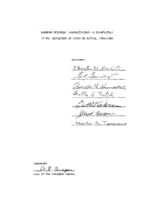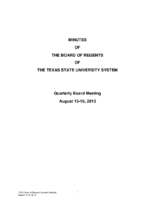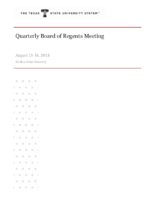Spanish Presidial Administration as Exemplified by the Inspection of Pedro de Rivera, 1724-1728
Description
Retta Murphy's unpublished doctorial dissertation signed by advisors for the University of Texas. Leaves iii-iv:
"The presidio, the mission, and the town were characteristic features of Spanish imperial expansion in America. In the accumulation and preservation of official records, and consequently in the presentation of facts to historical investigators, the presidio was far less notable than either the mission or the civil settlement. In the study of the history of colonial Spanish America a great deal of interest and emphasis has centered upon the sites, the foundings, the efforts, and the significances of numerous missions, as well as upon the development or decline of some towns. Military institutions have received less emphasis, except in the narratives of campaigns and conquests. Increasing investigation of presidial affairs, however, is according a finer balance to the whole study of the Spanish American colonies. In the eighteenth century the Spanish colonial empire was usually more active in the work of maintenance than in that of expansion, and New Spain was the most important part of that empire. The military posts in northern New Spain contributed no little to the institutional life of the frontiers and to the problems of the governing officials in Madrid and in the City of Mexico. It is the purpose of this writing to portray many of these problems of military administration, as they were producing, early in the second quarter of that century, a program of reform which centered around the presidial inspection by Brigadier Don Pedro de Rivera."
"The presidio, the mission, and the town were characteristic features of Spanish imperial expansion in America. In the accumulation and preservation of official records, and consequently in the presentation of facts to historical investigators, the presidio was far less notable than either the mission or the civil settlement. In the study of the history of colonial Spanish America a great deal of interest and emphasis has centered upon the sites, the foundings, the efforts, and the significances of numerous missions, as well as upon the development or decline of some towns. Military institutions have received less emphasis, except in the narratives of campaigns and conquests. Increasing investigation of presidial affairs, however, is according a finer balance to the whole study of the Spanish American colonies. In the eighteenth century the Spanish colonial empire was usually more active in the work of maintenance than in that of expansion, and New Spain was the most important part of that empire. The military posts in northern New Spain contributed no little to the institutional life of the frontiers and to the problems of the governing officials in Madrid and in the City of Mexico. It is the purpose of this writing to portray many of these problems of military administration, as they were producing, early in the second quarter of that century, a program of reform which centered around the presidial inspection by Brigadier Don Pedro de Rivera."



